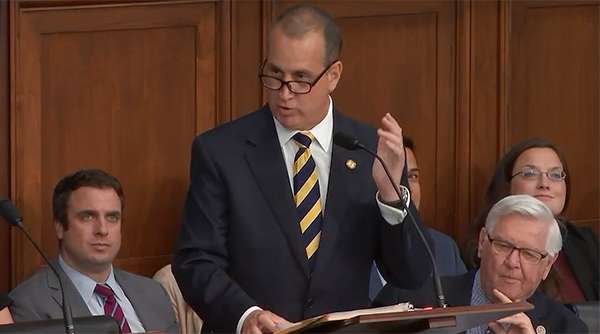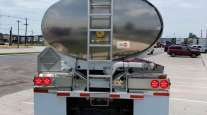Senior Reporter
ELD Provision in Transportation Bill Missing Crucial Support in Congress

A provision in a House funding bill that would delay implementation of electronic logging devices for carriers that serve the agricultural sector faces an uphill battle and drew immediate criticism from the trucking industry.
Language in the same bill that would pre-empt state laws for meal and rest breaks for truckers faces a clearer path forward, however, as it already has backing in the Senate.
A report accompanying the 2018 funding measure, advanced by the House on July 17, includes a provision that would require a study of the Federal Motor Carrier Safety Administration’s mandate for adoption of ELDs, but it has not gained traction among House leaders and senior senators. Lacking such endorsements just a few months before the mandate’s Dec. 18 implementation hurts the chances of any changes to it reaching the president’s desk.
The report directs FMCSA to provide Congress with a study within 60 days of the bill’s enactment into law that would outline options for delaying the mandate. If the legislation is reported out of the chamber, any provisions different from what Senators approve in their bill would need to be reconciled before a final bill reaches the president. If the ELD provision clears those hurdles and the bill is signed into law, FMCSA would then have two months to deliver the report to Congress.
“Many carriers have delayed purchase and installation of ELDs until they can be certain the technology will be compliant,” according to the bill’s report. FMCSA strongly backs the ELD mandate, as do industry stakeholders, including American Trucking Associations.
With carriers already preparing for the mandate, the House provision might raise alarm within the industry. However, ATA Executive Vice president for Advocacy Bill Sullivan told Transport Topics in a July 19 interview that the narrow exemption sought by a small sector of the agricultural industry is not a delay of the ELD mandate.
“Concerns about ELD compliance from some quarters of the industry, we believe, are wrongly directed at electronic logging, when they’re in fact concerns about hours-of-service rules,” Sullivan said. “The electronic logging device was a rule mandated by Congress. … Congress is who brought this to the attention of the agency. Congress is going to back it up.”
The House bill would not fund in fiscal 2018 enforcement of the mandate for carriers transporting livestock and insects. The report explained that lawmakers sought to address concerns raised by livestock haulers by calling on FMCSA to continue using its “regulatory tools to grant relief that appropriately reconciles highway safety with the unique needs of these carriers” and the livestock.
The scope of the meal and rest break provision is more far-reaching and benefits from a companion provision in a Senate aviation reauthorization bill. That provision is sponsored by Deb Fischer (R-Neb.), chairwoman of the Surface Transportation Subcommittee, which oversees trucking regulations.
The legislation calls on a “state, political subdivision of a state, or political authority of two or more states” to not enact or enforce a law having to do with meal and rest break requirements. ATA is among the groups supporting the provision and noted to its membership that it would clarify a requirement in a 1994 aviation law to block a California law signed in 2011.
The California law requires employers to provide a “duty-free” 30-minute meal break for employees who work more than five hours a day as well as a second “duty-free” 30-minute meal break for those who work more than 10 hours a day.
An attempt by Rep. David Price (D-N.C.) to strip the meal and rest break provision from the bill was rejected along party lines.
The panel also rejected an amendment by Rep. Rosa DeLauro (D-Conn.) that would have restored the Transportation Investment Generating Economic Recovery (TIGER) grants in fiscal 2018. The House bill would cancel the TIGER grants, for which Congress authorized $500 million in fiscal 2017.
Other trucking provisions tucked into the bill included prohibiting FMCSA from proceeding with a safety fitness determination rule until the DOT’s inspector general issues certain certifications required under law.
The measure, which would fund the U.S. Department of Transportation through fiscal 2018, was reported to the House floor on a 31-20 vote, mostly along party lines.
It would provide $17.8 billion for the DOT’s discretionary budget for the next fiscal year. The request from the Trump administration came in at $16.2 billion for the department.
The bill also would provide FMCSA with $758 million, a $113.6 million increase over fiscal 2017. Nearly half that funding would go toward safety assistance programs. Also, $31.8 million would go for a commercial driver license implementation program, and $43.1 million would be earmarked for high-priority activities.
The National Highway Traffic Safety Administration would receive $927 million, which would be $15 million above the fiscal 2017 level, and the Pipelines and Hazardous Materials Safety Administration would receive $268 million, which would be $3.7 million above the fiscal 2017 level.
“We have targeted funding in this bill to essential investments in safety, infrastructure and housing assistance for our most vulnerable populations,” said Rep. Mario Diaz-Balart (R-Fla.), the chamber’s top transportation funding leader.
“Safety is also a priority in this bill, with responsible increases provided for DOT’s various transportation safety programs and essential funding maintained for rail safety,” Appropriations Committee Chairman Rodney Frelinghuysen (R-N.J.) said.




